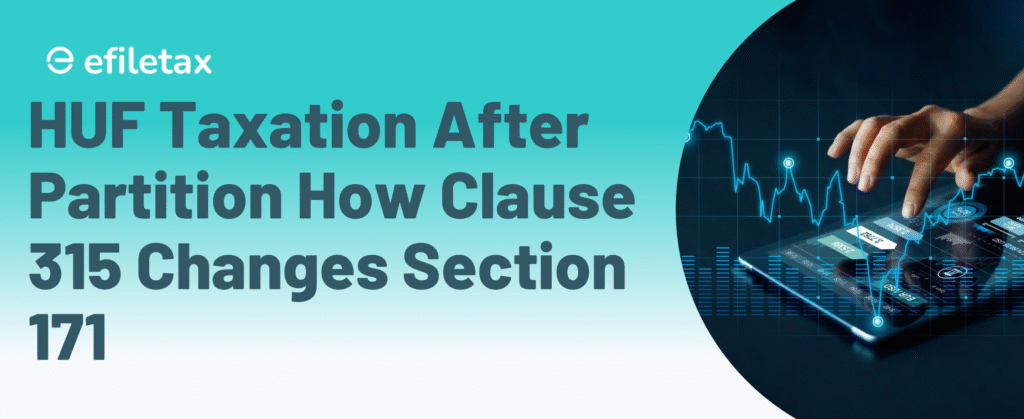
Summary
Clause 315 of the Income Tax Bill 2025 refines the rules for taxation of HUF after partition, aligning with modern family structures. It updates Section 171 of the Income Tax Act 1961 to streamline assessments, liability allocation, and protect tax revenue during partition disputes.
Introduction
Taxation of HUF after Partition is a crucial area for many Indian families. The Income Tax Bill 2025’s Clause 315 revises old rules under Section 171 of the Income Tax Act, 1961, making it clearer how tax applies when a Hindu Undivided Family splits its assets.
Why Clause 315 Was Needed
Partition of a HUF often sparks disputes over income, assets, and tax liability. The 1961 Act’s Section 171 laid down procedures but lacked clarity on:
- Partial vs. total partition
- Joint family income during disputes
- Tax recovery from members
Clause 315 modernises this to match current legal and family realities.
Key Highlights: Clause 315 vs. Section 171
| Aspect | Section 171 (1961 Act) | Clause 315 (2025 Bill) |
|---|---|---|
| Partition Definition | Recognised only total partitions for tax | Still focuses on total partition but clarifies partial claims |
| Who decides partition? | AO had wide power to inquire | Similar power but tighter timelines |
| Liability allocation | Joint liability till date of partition | Joint and several liability + explicit recovery rules |
| Partial Partition | Not recognised after 31.12.1978 | Reiterates prohibition but adds clarity on disputes |
How Does the New Clause Work?
👉 Step 1: Family claims partition before Assessing Officer (AO).
👉 Step 2: AO must verify within a specified time frame.
👉 Step 3: If satisfied, AO divides the income and assigns liability among members.
👉 Step 4: Even after partition, all members remain jointly and severally liable for past taxes.
Legal References
- Income Tax Bill, 2025 — Clause 315 (Draft link: incometaxindia.gov.in)
- Income-tax Act, 1961 — Section 171
- Supreme Court in Kalyani Roy v. CIT (1970): Clarified the importance of proper partition claim.
Expert Tip
🔑 Practical advice: Always file a written partition claim with clear asset division. Keep signed family deeds. This prevents tax disputes and ensures smooth assessments under Clause 315.
FAQs on Taxation of HUF after Partition
Q1. Can partial partitions reduce tax liability?
No. Partial partitions are not recognised for tax purposes. The law considers the HUF intact until a total partition is proven.
Q2. Who pays old tax dues after partition?
All family members share joint responsibility for past taxes even after splitting assets.
Q3. Is a court decree needed for partition?
Not mandatory. But a registered family settlement or clear documentary proof helps.
Conclusion
Clause 315 in the new Income Tax Bill 2025 provides a clearer, fairer system for taxation of HUF after partition. Families must plan carefully and maintain proper records to avoid tax troubles.